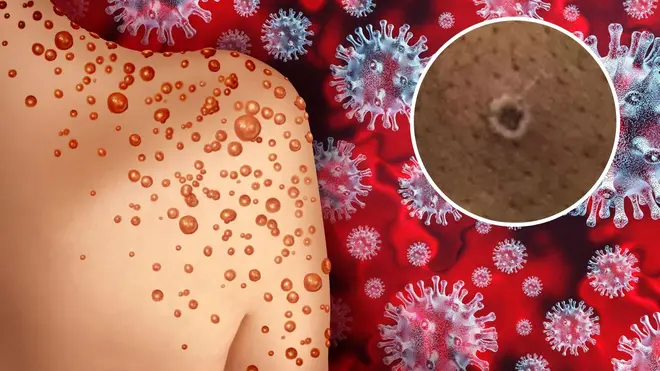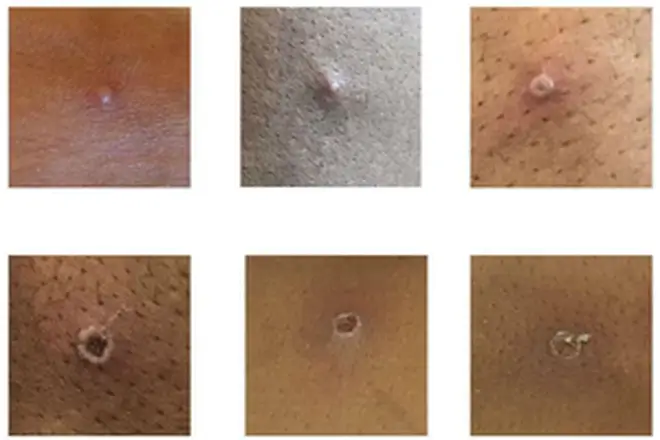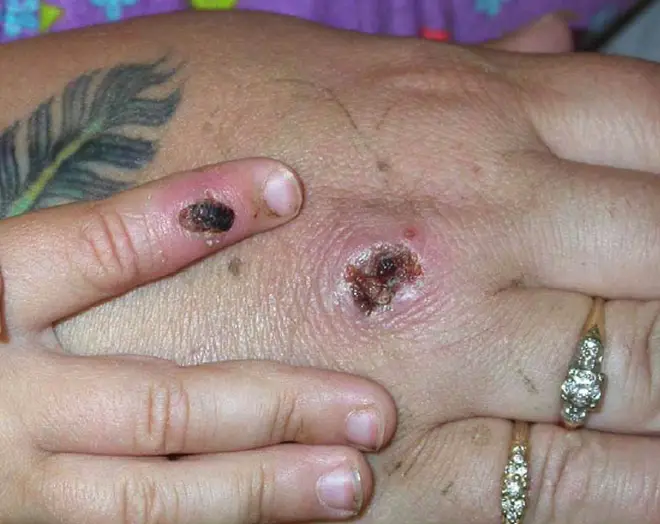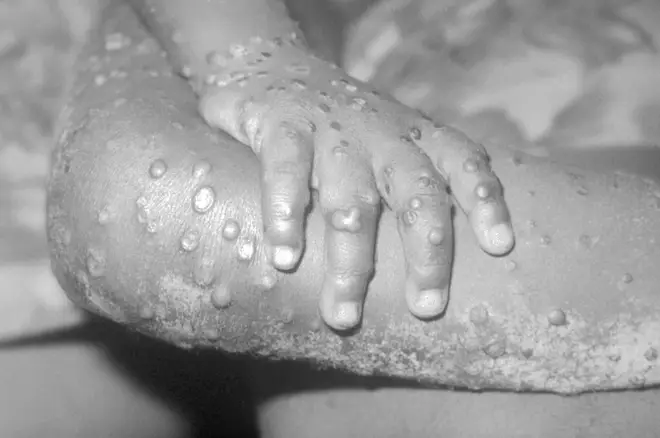
Clive Bull 1am - 4am
21 May 2022, 19:14 | Updated: 31 May 2022, 15:52

Monkeypox cases are spreading across the UK and people are being urged to look out for symptoms - so what is the disease and how does it spread?
In the UK 20 cases of monkeypox virus have been confirmed, though officials expect that number to rise.
A top doctor is warning the outbreak in the UK could have an impact on sexual health services, as it can be transmitted from person to person through close physical contact - including sexual intercourse.
The disease, which was first found in monkeys, can be transmitted from person to person through close physical contact.
Monkeypox is usually found in West Africa, and the virus does not often spread elsewhere.
That is why outbreaks reported in Europe, Canada, Australia and the United States have cased alarm among public health experts.
The disease is usually mild but can cause severe illness in some cases.
Read more: Monkeypox outbreak linked to superspreader event at adult sauna

The UK Health Security Agency (UKHSA) said that initial symptoms of monkeypox include fever, headache, muscle aches, backache, swollen lymph nodes, chills and exhaustion.
A rash can develop, often beginning on the face, which then spreads to other parts of the body including the genitals.
The rash can look like chickenpox or syphilis, and scabs can form which then fall off.
The incubation period of monkeypox is usually from six to 13 days but can range from five to 21 days.
The World Health Organisation (WHO) said the monkeypox virus can live on surfaces such as bedsheets or towels.
People are advised to look out for rashes that are unusual to them or an ulceration.
Anyone with symptoms has been advised to refrain from having sex by the UKHSA.
To date, there are 190 cases in the UK, with the initial case having returned from travel to Nigeria.
The World Health Organisation (WHO) says that, based on currently available information, some people are catching the infection in the UK.
It is understood to be convening emergency meetings on the issue.
The UK Health Security Agency (UKHSA) said that 183 cases have been confirmed in England since May 7.
Meanwhile, four cases have been confirmed in Scotland, two in Northern Ireland and one in Wales.

High risk contacts of monkeypox cases are being urged to self-isolate and avoid contact with children for three weeks in the UK.
According to guidance from the UKHSA, people who have had direct unprotected contact with a case will be advised to self-isolate for 21 days, including not going into the workplace.
The guidance also states contacts should “avoid contact with immunosuppressed people, pregnant women, and children aged under 12 where possible”.
Individuals considered “high risk contacts” will be offered the smallpox vaccine, which has historically been shown to be protective against monkeypox.
Household contacts, sexual contacts, and those changing a patient’s bedding without appropriate PPE are all considered to be high risk under the UKHSA's guidance.
Medium risk contacts will also be offered the vaccine, encouraged to avoid contact with the above groups and receive daily communication from authorities, but they are not asked to self-isolate, the guidance says.
These include passengers seated directly next to a monkeypox case on a flight, and those who shared a car or taxi with a case.
Monkeypox is not normally a sexually-transmitted infection, but it can be passed on by direct contact during sex.
A link was first drawn between gay men and monkeypox in the UK earlier in the week, with the UK Health Security Agency (UKHSA) urging men who have sex with men to be alert to any new rashes or lesions on their body.
Gay and bisexual men are being asked "to be alert" to possible symptoms, such as rashes or lesions on any part of their body, especially their genitalia.
The outbreak of cases in the UK has led to some sexual health clinics reintroducing social distancing measures and even asking patients about any unusual bumps or rashes ahead of their appointment.
Dr Claire Dewsnap, president of the British Association for Sexual Health and HIV, said she is concerned about how the infection could affect services because staff who come in contact with sufferers are forced to isolate.
She told the BBC that clinic staff were "already under significant pressure" before monkeypox was identified, making the situation worse.
She said it is "stretching the workforce" but in terms of the infection and its consequences for individuals, she is "not that concerned".
"But I am concerned about our ability to maintain good sexual health services and access for everyone while still managing this new infection," she said.

Belgium has become the first country to introduce a compulsory 21-day monkeypox quarantine, as 14 countries have confirmed outbreaks and UK doctors warn more cases are being identified every day.
Those who contract the virus will now have to self-isolate for three weeks, Belgian health authorities have said, after three cases were recorded in the country.
The infections, the first of which was recorded on Friday, are all linked to a festival in the port city of Antwerp.
Cases of the virus have also been linked to a superspreader event at an adult sauna in Madrid, Spain.
The region’s cabinet minister for community health, Enrique Ruiz Escudero, said that health officials had traced many of Spain’s 30 monkeypox cases to a single sauna in the capital.
The virus spreads through close contact and the UKHSA is advising people, particularly those who are gay, bisexual or who have sex with men, to be alert to any unusual rashes or lesions on any part of their body.
Anyone who is worried is advised to contact sexual health services and to call ahead for an appointment, or to call 111.
The UKHSA said the virus does not usually spread easily between people and the risk to the UK population overall remains low.
It is carrying out contact tracing of people who have been in close contact with the affected.
The smallpox vaccine, which has effectiveness against monkeypox, is being offered to some people who have had close contact with affected individuals.